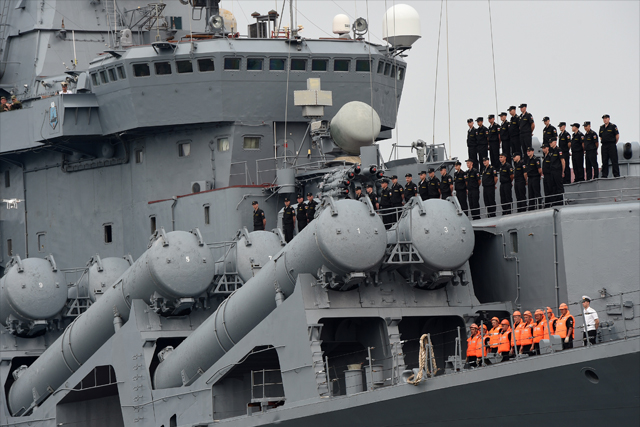Why maritime defense cooperation is necessary, possible, promising

Russian sailors of the missile cruiser Varyag stand next to the missile launch pad as the vessel arrives at the international port of Manila on April 20, 2017. AFP/Ted Aljibe
The wide-ranging rivalries between major powers, such as the United States, China or Japan, can be riveting to watch as an outsider. Whether we are looking at the direction of trade and investment (e.g. the death of the Trans-Pacific Partnership or the rise of the Belt and Road Initiative) or the pace of military build-ups, the movements in these rivalries reverberate in the decisions that smaller states take to protect their interests. In keeping both eyes on major powers, however, we can lose sight of the efforts begun on the initiative of smaller states. Yet, these efforts, taken individually or as a whole, can also shape our neighborhood.
Evolving challenges
While looking at Philippine defense cooperation initiatives in October last year, I wrote that developments in the country’s external and internal environments had heightened the pressure on our defense providers to safeguard lives and the national patrimony. More specifically, “the September marketplace explosion in Davao City, the Filipino and foreign civilians kidnapped and held hostage in the Sulu-Sulawesi corridor, and the reported exclusion of Filipinos from Scarborough have become vivid symbols of a defense establishment pressed on many fronts.”
In recent weeks, we have seen new forms of these challenges play out in Marawi, where longstanding sea-going connections between armed groups and their safe havens have escalated beyond irregular skirmishes with our armed forces into highly destructive urban warfare.
In facing these types of challenges, the Philippines has plenty of company. The interconnected character of modern-day defense problems requires even the most capable governments to work with others. Many countries, especially in Southeast Asia, share our concerns over radical and more sophisticated armed groups uniting across borders to extend the reach of Islamic State, to conduct multi-million-dollar kidnap-for-ransom campaigns, or to hijack ships at sea.
In this context, we can take advantage of our geographic position and experience in counter-terror and counter-insurgency operations, as well as peace negotiations, to be a reliable contributor to international defense cooperation. In the same vein, we stand to gain from working with and learning from those that have valuable experiences and capabilities of their own.
The Malacca model or a ‘coalition of the relevant’
At last week’s Shangri-La Dialogue, one important development—the Sulu Sea patrols of the Philippines, Malaysia, and Indonesia—was repeatedly cited, together with the more established Malacca Straits patrol, as a good step forward and a promising model for future collaboration. This option, sometimes called a “coalition of the relevant,” could be a way through which smaller states could join efforts to meet a clear need without being over-burdened by the processes of the multilateral institutions that they are a part of (e.g. ASEAN). The sea patrols will reportedly begin this weekend, on June 19.
The trilateral patrols set up along the Sulu-Sulawesi corridor are not the first examples of inter-governmental defense cooperation in ASEAN. In 2004, Indonesia, Malaysia, and Singapore first organized trilateral sea patrols to protect transit along the Malacca Strait further east, in a program that may have served as a template for the Sulu-Sulawesi patrols to follow. In 2005, the Malacca patrols added an aerial dimension to surveillance through the launch of the “Eyes in the Sky” program; Thailand also joined, turning the aerial portion of the patrols and the intelligence-sharing scheme into a quadrilateral effort.
The speed at which the Philippines-Indonesia-Malaysia program has progressed from principle to sea and air patrols suggests both the urgency of the situation and the confidence in the Malacca-type model of cooperation. The Malacca patrols have been credited with reducing the rates of crimes at sea. After 2004, the number of piracy incidents in the strait fell steadily, such that by 2009, Southeast Asia accounted for only 11 percent of global incidents, its lowest share of worldwide incidents since 1994.
As participants in the Malacca patrols, both Indonesia and Malaysia would have been familiar with and comfortable enough with the program to proceed quickly when given the green light from the Philippine government.
Broader context
Away from the grand strategic themes of major powers, there is no shortage in desire within Southeast Asia to get important work done even in the smallest areas of cooperation. Their success of previous patrols has provided the region more confidence in a homegrown, independent ability to cooperate over and successfully manage security challenges without external parties. Moreover, the Philippine experience from coordinated patrols in the Sulu-Sulawesi area could be a springboard for greater confidence in cooperation. If these efforts take off, we will have even greater reason to pay equal attention to small state initiatives.
Angelica Mangahas is deputy executive director of the Stratbase Albert Del Rosario Institute (ADRi) and a lecturer with the International Studies department of De La Salle University in Manila. She completed her master’s degree in Security Studies at Georgetown University. Her writing and advocacy experience spans multiple international humanitarian and diplomatic organizations. Her current research focuses on Philippine and regional security concerns.
- Latest























